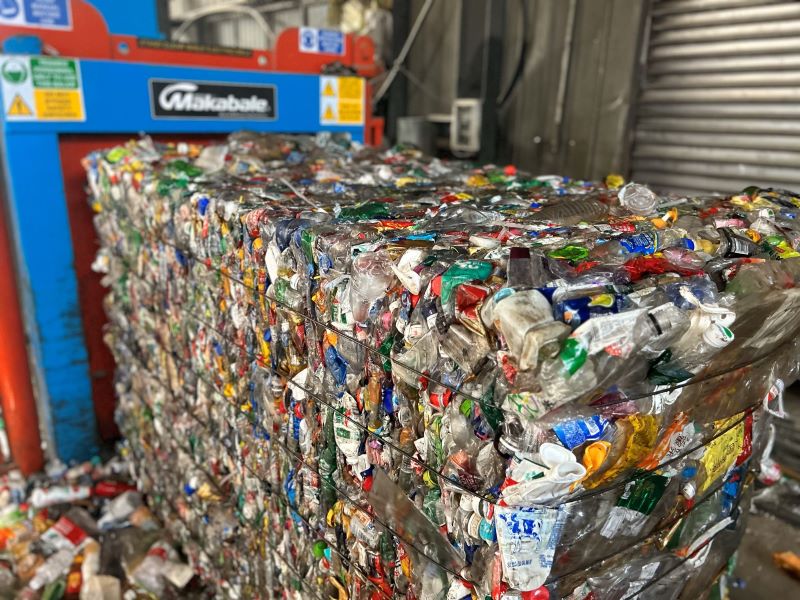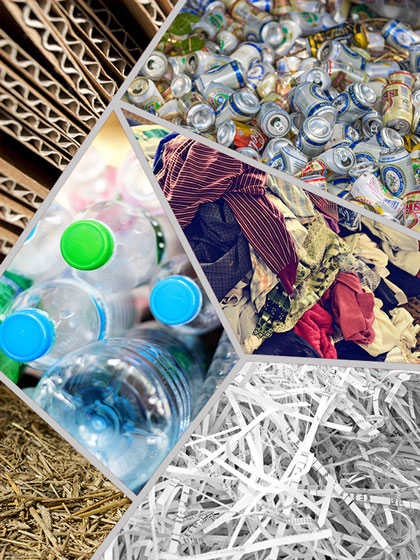
If you deal with PET bottles, HDPE containers, or both, chances are you’ve faced this problem: bulky, lightweight materials that take up way too much space and are expensive to handle.
That’s where a closed-end horizontal baler (or named closed-door horizontal baler) comes in. Whether you're running a recycling center, a manufacturing plant, or a distribution facility, this piece of plastic baler for PET and HDPE can make a world of difference.
In this blog, we’ll break down why a closed-end horizontal baler is the smart choice for handling PET and HDPE.
What Is a Closed-End Horizontal Baler?
Let’s start with the basics.
A closed-end horizontal baler is a machine that compresses recyclable materials — like PET (polyethylene terephthalate) and HDPE (high-density polyethylene) — into dense, stackable bales. The "closed-end" or called “closed-door” refers to the solid door at the end of the compression chamber, which helps produce tightly packed bales.
Unlike vertical balers or open-end horizontal balers, the closed-end baler offers:
- Higher bale density
- Full bale ejection
- More consistent bale size
- Lower maintenance
Think of it as the workhorse of the baling world — ideal for plastic recyclables that would otherwise fill your warehouse in no time.
Why Focus on PET & HDPE?
PET and HDPE are two of the most commonly recycled plastics worldwide.
- PET is what soda bottles and water bottles are made from.
- HDPE is found in milk jugs, detergent bottles, and other rigid containers.
These plastics are in high demand because they can be recycled into new containers, textiles, and industrial products. But handling them before they’re baled can be a logistical nightmare — lightweight but bulky, awkward to transport, and difficult to store.

How a Closed-End Horizontal Baler Solves the Problem
Space Savings That Matter
PET and HDPE containers are mostly air. Without baling, they fill up bins and trailers in no time.
With a closed-end horizontal baler to compact PET and HDPE waste, you can:
- Reduce volume by up to 90%
- Free up valuable warehouse space
- Stack bales neatly for easy handling
This means fewer trips to transport recyclables and more efficient use of your facility.
Save Big on Transportation Costs with Closed-end Baler
Transportation is one of the biggest expenses in recycling. The more air you’re hauling, the more you’re paying for nothing.
Denser plastic bales mean:
- More material per truckload
- Fewer trips needed
- Lower fuel costs and fewer emissions
For companies moving large volumes of PET or HDPE, this alone can lead to thousands of dollars in annual savings.
Get Better Prices for Your Bales
Buyers of recycled plastic want dense, uniform, mill-ready bales.
A closed-end horizontal baler helps you produce exactly that:
- Higher bale density means higher per-ton prices
- Consistent bale size improves buyer relationships
- Cleaner bales with less contamination are more attractive to processors
In other words, a small investment in the right baler can lead to better long-term returns on your recyclable materials.
Streamline Operations & Save Labor
Let’s be honest — nobody wants to waste time handling loose PET bottles or HDPE containers.
A closed-end horizontal baler automates much of the process:
- Automatic or semi-automatic operation
- Full bale ejection for easy removal
- Less manual handling required
This means your team can focus on more productive work while the baler does the heavy lifting.
Additional Benefits
Cleaner Work Environment
Loose plastic creates a mess. Baling your PET and HDPE keeps your facility:
- Cleaner
- Safer
- More organized
Less clutter means fewer slip hazards and a more professional work environment.
Easier Compliance with Regulations
In many industries, proper waste management is not just good practice — it’s required by law. A closed-end horizontal baler helps you:
- Stay compliant with waste handling regulations
- Meet sustainability goals
- Reduce landfill contributions
Long-Term Durability & Lower Maintenance
Compared to open-end or vertical balers, closed-end horizontal balers are known for their:
- Robust construction
- Fewer moving parts subject to wear
- Lower ongoing maintenance costs
When you invest in a high-quality machine from a reliable manufacturer (like us!), you’re setting your operation up for years of reliable service.

Who Should Consider a Closed-End Horizontal Baler?
If any of these sound familiar, this type of baler is a great fit:
- You generate large volumes of PET or HDPE
- You want to maximize space and reduce transport costs
- You need to produce consistent, high-density bales
- You want to improve operational efficiency
- You want to improve PET recycling with horizontal baler
- You’re looking to meet environmental goals
Whether you’re a dedicated recycling center, a beverage distributor, a manufacturer, or a logistics hub — a closed-end horizontal baler will help you handle PET and HDPE more efficiently.
Final Thoughts: The Smart Choice for Smarter Recycling
PET and HDPE aren’t going anywhere — demand for recycled plastics continues to grow as industries shift toward sustainable packaging and closed-loop recycling systems.
But to make the most of this opportunity, you need to handle these materials the right way. A closed-end horizontal baler gives you the edge by:
- Saving space
- Cutting costs
- Boosting bale quality
- Reducing labor and maintenance needs
And that’s good for both your bottom line and the planet.
Work with the Experts
We are a professional manufacturer of high-performance balers — with deep expertise in PET, HDPE, and other recyclables. We offer a wide range of closed-end horizontal balers to suit different business sizes and material types.
Our team will help you:
- Choose the right baler for your needs
- Optimize your recycling process
- Maximize ROI and operational efficiency
If you’re ready to take your PET and HDPE recycling to the next level, contact us today for a free consultation.
We’d love to help you find the perfect baler solution for your business!
